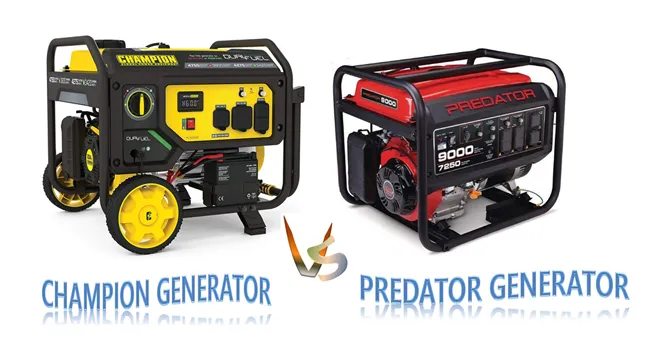Last Updated on May 10, 2023
There’s nothing worse than running out of energy while RV camping. You can’t run the AC, you can’t cook dinner, and you definitely can’t keep your phone charged.
RV generators are necessary equipment, but they can be expensive and difficult to choose from. This comparison between Champion VS Predator Generator might be helpful for you in finding the right one.
This article will compare these two most well-respected brands’ generators, buying guide for choosing the ideal one, some advantages & disadvantages of these two brands’ generators, the benefits of having a portable generator, and some frequently asked questions.
In-Depth Comparison Between Champion VS Predator Generator
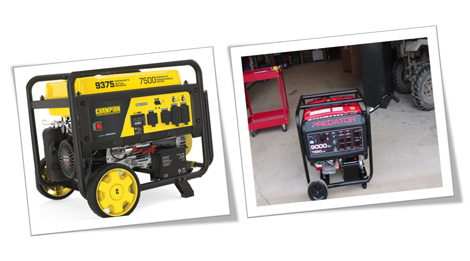
RVing is a great way to see the country, but it can be tough to find a power source when you’re on the go. RV owners are always looking for ways to save money, and one of the best ways is by using a generator.
Let’s discuss these two types of affordable generators key differences:
Brands Comparison:
Predator is a subsidiary of the well-known tool firm Harbor Freight, in business since 1988. This company is not only known for its tools but its outstanding customer service. The company offers a wide range of products and tools and provides quality for affordable prices.
Champion is also one of the most well-respected brands in the market to generate power. They have been around since 2003, but they’ve quickly gained popularity among RVers and campers for their high-quality generators that come with a dependable and durable design with free lifetime technical support.
Inverter Technology:
Inverter technology is one of the most well-known and reliable technologies in the market to generate power.
Predator uses Inverter Generator, which offers a quiet generator and smoother output than conventional generators. The only downside of inverters is that they tend to be pricier, but an investment in an inverter generator can last you for years.
Champion offers Dual-fuel inverter generator, but they are also available in conventional models. The traditional generators are cheaper but provide less run time than Predator, making them better for smaller campers.
Fuel Type:
Both companies offer their products in gasoline and propane. Their gasoline generators generally perform better than the ones that run on propane. Still, both types of generators provide the same convenience and ease of portability when it comes to moving them around your RV or campsite.
Champion generators are notable for their dual-fuel capability either gasoline or propane, as this feature significantly increases their versatility.
There is no propane intake in Predator generators, which means their fuel tanks are larger. If you’re planning to run your generator primarily on gasoline, that will make a big difference in how long you can run your generator without stopping for refueling.
Run Time:
The run time for generators is measured in hours, and it depends on what you plan to use your generator for.
Predator generators can provide up to 12 hours of run time on a full tank at 25% load, making them better suited for RVs or campsites that require a lot of power.
Champion can run for up to 11 hours on a full gasoline tank at 25% load and 24hours on a full propane tank at 25% load. They are better suited for smaller campers or RVs that require less energy.
Pricing:
Generally, dual-fuel generators are more expensive than gasoline-only generators, which means that Champion was able to match Predator’s price is quite impressive.
Advantages & Disadvantages of Champion and Predator Generators
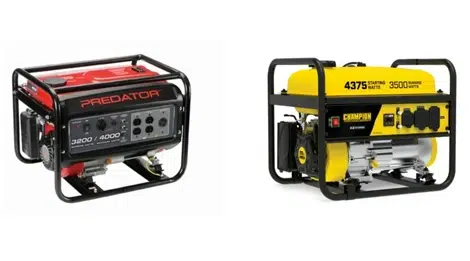
Although these two companies make high-quality generators, they both have pros and cons. You can decide which one suits your requirements better by weighing their advantages and disadvantages against each other.
01. Champion generator offer a dual-fuel model, a significant advantage over the Predator single fuel generator.
02. By leaving open the possibility of using propane with your Champion generator instead of gasoline, you can achieve much-increased flexibility than the Predator generators.
03. The only way Predator generators can combat Champion is with larger fuel tanks, and this trait only applies to models offering 3,000 watts or more.
Which Generator is Better Suited for You?
Both companies offer high-quality generators that can meet the needs of most RVers or campers. The only way to answer which generator is better suited for your needs is to compare the advantages and disadvantages that each generator offers.
Champion generators are better if you’re looking for a dual fuel lightweight generator, but Predator is better suited for those who prefer single-fuel generators with larger tank capacity.
In general, Predator generators have a better value for money because you’re getting more energy more run time for less money. Champion offers dual fuel models that are significantly more expensive than the gasoline-only options of Predator.
So the choice is up to you. A Champion power equipment generator is better if you want a dual-fuel generator for more flexibility. But if you prefer single fuel generators over dual-fuel generators, Predator is likely the way to go for you.
One thing is sure; both companies offer high-quality products that will serve you well! But before you purchase any of these generators, there are several factors to consider.
Factors to Consider for Choosing Generators
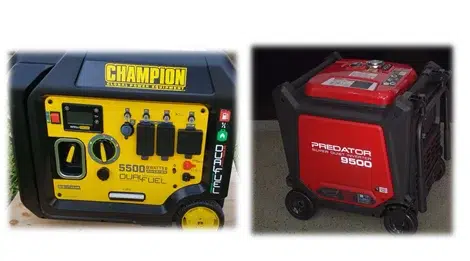
It’s not always easy to find a power source when you need one, and generators can be loud and smelly. The following factors can help you make your decision easier.
Power Output:
You should consider the power output of the generator before you make a purchase. It’s essential to know how much power your appliances require and then choose a generator that can provide this much power without any problems.
Models vary in power output, with some models having more power output but remaining affordable. Consider the starting and running wattages when evaluating the same power output.
A generator may be rated at 3000 watts, but the running wattage would be 2800 watts. Therefore, make sure you choose the right generator for your electrical load at all times.
Fuel Type:
Another thing to consider is what fuel type will be more convenient for you. Gasoline generators are easier to use, but propane generators might be the better choice if you have your propane tank.
Fuel Capacity:
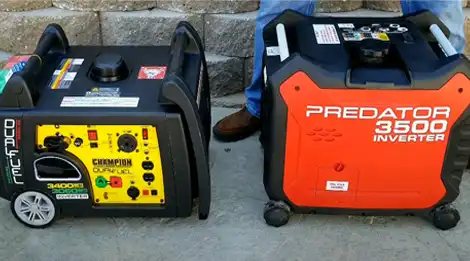
The fuel capacity can determine how long a generator lasts on one full gas tank. It’s essential to consider the run time on one tank when choosing a generator and that some generators have low fuel consumption even with high wattage.
Multi-Fuel Capability:
Some generators can operate on multiple different types of fuel, including gasoline, propane, natural gas, and diesel. This is ideal if you want a generator that can work as a backup power source for all of your appliances, as you don’t have to worry about running out of the correct fuel type.
Fuel-Efficient:
Although having more fuel economy on hand is sturdy, choosing a generator that offers better fuel efficiency for your money is best. A generator with better fuel efficiency has the bonus of being significantly quieter compared to generators with higher fuel consumption.
Noise Level:
One important thing that is often overlooked is noise level. Decide the priority for you between power and low noise output level before purchasing to make sure it meets your requirements.
Consider the sound level rated by the manufacturer. In the case of a model whose noise level is below 60 dBA, it can be considered a quiet generator.
Portability:
To make sure you can move the generator easily, it’s best to look for one that has wheels with a handle, but some generators even offer folding handles for more accessible storage.
Maintenance Requirements:
Although generators are simple machines, most require maintenance to keep them in good condition after prolonged use. The amount and type of care required can vary from model to model, so be sure you know what your generator needs before purchasing.
Inverter Generator:
Some generators are more powerful, but they only offer DC power. If you need AC power to run your appliances, be sure to choose an inverter generator with the right wattage output.
Ease of Use:
As with any device, ease of use is essential before you purchase. It’s best to choose a generator with an easy-to-read all your controls panel and starter button for added convenience.
Safety:
Last but not least, make sure you choose a generator with safety features like overload protection. Look for models with low oil shutdown and voltage regulation to prevent the generator from overheating or your home appliances from getting damaged if there is an unexpected power surge.
The Benefits of Owning a Generator While RVing
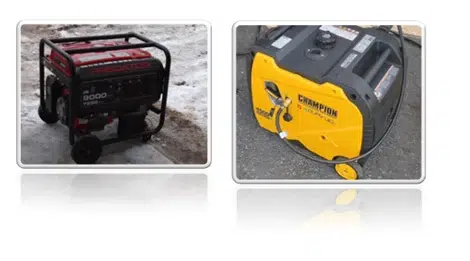
A generator is a great way to have power whenever you want it, even if there’s no electricity available. With a generator, you’ll never have to worry about running out of power or being without power during an emergency or natural disaster.
You can also use your generator to charge batteries and appliances that run on DC power, like laptops and televisions. Below are the benefits of owning a generator while RVing:
- It can be used to eliminate your need for an electrical service
- It can give you a backup power source when there’s a disruption in electricity
- It’s ideal for dry camping sites and boondocking locations
- A generator allows you to bring all of the comforts from home with you
- It can be a lifesaver in an emergency
- It keeps you safe from harmful power surges and outages
- A generator is ideal when you want to cook or heat food with a stove or oven
- A generator gives you the option of heating your water using a water heater
- It allows you to bring appliances that require more power, like a coffee maker, toaster oven, or microwave
- It can be used as your primary source of electricity when you’re dry camping
Generators are an excellent addition to any home or Rv, whether you’re at home or on the road. A generator keeps you prepared for the future when emergencies happen or when there’s a disruption in electricity.
FAQs
Let’s talk about some frequently asked questions about these two brands generator:
01. Is Champion a Good Generator Brand?
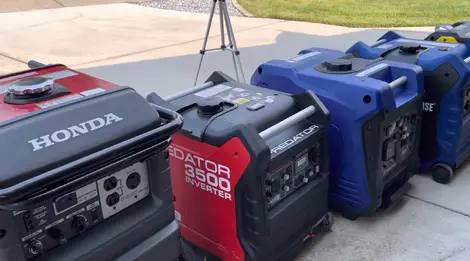
A reliable generator well-suited for DIY projects and camping, the Champion power equipment Gasoline portable generators feature Cold Start technology. This champion generator ensures a rapid start in cold weather.
02. What is the Quietest Dual Fuel Inverter Generator?
With a noise level of less than 60dBA, the Champion Power Equipment generators are the quietest generators on the market.
03. What Size Inverter Generators Do I Need for My RV?
It depends on your needs, but consider that 2,000 to 4000 watts inverter generators are more suitable for camping.
04. What is the Largest Power Output for an Inverter Generator?
There is a limited range of power output when it comes to inverter generators. The largest-output inverters can only produce approximately 7,000 watts.
05. What Type of Generator is Best for an RV?
An inverter generator is best for RVs because it efficiently converts power and supplies cleaner power than generators designed to run at a fixed speed.
In addition to having enclosed bodies, they are also quiet enough to run in a campground. Microprocessors integrated into inverter generators are considered ‘smart’ devices.
06. Can I Use a Regular Generator on my RV?
You can only use a regular generator on an RV if it’s been specifically designed for RVs. Otherwise, you’ll need a more powerful inverter generator with an automatic voltage regulator.
07. What Fuel does an RV Generator Use?
A: Diesel, gasoline, and propane are the most common types of fuel used to power built-in RV generators. Some RV generators with gasoline and diesel engines may be able to utilize the RV’s fuel tanks as well as their own.
08. Is it OK to Let the Generator Run Out of Gas?
It is not advisable to leave portable gas-powered generators running until their fuel runs out. The coils of your generator may become de-magnetized if you run out of gas. As a result, the residual magnetism of the generator is drained when the load is abruptly terminated.
In Conclusion
Owning a portable generator is a great way to ensure you always have power, whether there’s an outage or not. They’re convenient when you’re RVing and want all the comforts of home with you.
Not only are generators helpful in powering your appliances, but they can also be lifesavers in emergencies. With so many benefits to owning a generator, it’s no wonder they’re such a popular addition to any home or RV.
We hope this article about the Champion VS Predator generator was helpful for you to find an ideal generator for your RV.
